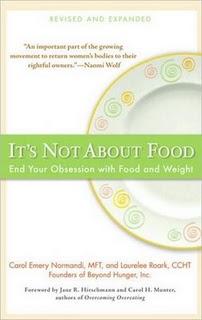It's Not About Food: End Your Obsession with Food and Weight

The new year is upon us, and it’s not just because George W. Bush has finally left the White House. Whenever we decide to turn on our televisions, the Resolutions Monster is there. It appears as a perky model that lost fifty pounds after some fad diet. We look at our own bodies in disgust, poking at the extra pounds of flesh formed after gorging extra slices of pumpkin pie. Summer suddenly creeps up on us like our monthly cycles and those dreams of wearing a bikini are shattered.
There aren’t many options in combating the Resolutions Monster. We could either eat all the greasy Chinese we desire, or shove fingers down our throats in hopes that the salad from lunch hasn’t turned into fat. Fortunately, two women have discovered a new solution, one that will hopefully put an end to the vicious cycle of vanity.
Carol Emery Normandi and Laurelee Roark spent years of struggling with eating disorders because, like millions of others, they yearned to look and feel 'beautiful' every year. Despite fasting, vomiting, and dieting, they've never won the bulge battle—at least not until they formed the nonprofit organization Beyond Hunger, which targets the negative viewpoints of weight created by women. In their latest revised version of It's Not about Food, Normandi and Roark expose the appalling relationship women have with their bodies and how they can overcome them.
Along with personal tales of how they punished themselves with laxative pills, these women reveal advice on taming hunger and how releasing years of shame is the key to respecting and loving every inch of us. The mission seems impossible, but their insightful chapters are nothing short of inspiring and worth the read until the very end.
One of the surprising exercises that Normandi and Roark suggest to readers is eating exactly what you want. Whether it’s freshly baked chocolate chip cookies or potato chips, eat away! It may sound like a terrible trick, but it’s the first stepping stone to being at peace with food. "It is very helpful to have with you at all times snacks that you like and can eat whenever you feel hungry," they explain. "This cuts down on the cycle of binging. You won’t get too hungry and slam down any old thing if you have your favorite foods with you." While this may be true, should we just give up fruits and vegetables for fried chicken and cheesecake?
Before the book is thrown out for seemingly lacking the knowledge readers need to physically improve themselves, Normadi and Roark provide step-by-step meditation rituals on savoring each bite we eat, when to know the signals of being full, and how to stop relying on food for emotional support. They state, "Go into your body and get into your sensual feelings about your body—excited, passionate, turned on, or climactic. Let yourself become childlike—be absolutely delighted with your body."
In other words, discovering all those curves and erogenous zones that make us feel like goddesses is good for our hearts, along with keeping a journal, complimenting yourself in front of a mirror naked, and creating plans to nurture your shape. Does bubble baths and personal massages ring a bell?
It may be a new year, but that doesn't mean we should force ourselves to hate who we are just because we don't look like Beyonce. We must learn to overcome a society that believes Jessica Simpson's new voluptuous shape is newsworthy. It's Not about Food provides women of all ages the tools needed to not only become content with so-called flaws, but also the determination to build much-needed confidence for happier lives. It is then that we can focus on ways to become healthier without dieting to death.
I think this is a really good point. All diets are basically things we can't do long term... so if we are going to always want treats we have to find a way to have some treats and not feel like we are dieting.